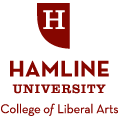Date of Award
Spring 2016
Degree Type
Honors Project
School
College of Liberal Arts
First Advisor
Kristina Deffenbacher
Abstract
As the internationally best-selling series Harry Potter by J.K. Rowling moves into its second generation of readers, it becomes increasingly important to analyze the assumptions it communicates about power differentials between people and belief systems. A central tenant of narrative paradigm holds that humans are innately narrative, internalizing narrative frameworks as a means to understand the world which then become externalized through human action. Thus, while the social hierarchies, collective actions, and institutional authorities in the fantasy world of Harry Potter in some ways map onto Anglo-American social and political structures, the significant differences between these textual and “real world” structures reveal the complex, often entangled ways of distributing power in both contexts.
Through identifying and analyzing the complex power systems within the Harry Potter novels, this essay critiques the contradicting power struggles that simultaneously pursue social revolution and maintenance of a traditional feudal fantasy. This involves an in-depth critique of how power is apportioned throughout society through four general locations of power. By locating power as ideological, individual, collective, and institutional it creates a framework to analyze the varying types of power exhibited in the Wizarding world, which is then used to interpret how these structures compete or cooperate. The competing power dynamics between locations of power, such as the individual power enacted by Harry and Dumbledore in their acts of civil disobedience against the Ministry of Magic, reflect the novels’ tension between the desire for social revolution and the desire for tradition/nostalgia. These competing desires that erupt from various power structures – which reflect many of the same structures and modes of thinking in the real world – invite a criticism of the narrative frameworks in the novels, which as they become externalized through human action invite criticism of the normative behaviors of real world power structures.
Recommended Citation
Marciniak, Aaron D., "“There is only power”: Surveying the Structures and Operations of Power in the Magical World of Harry Potter" (2016). Departmental Honors Projects. 42.
https://digitalcommons.hamline.edu/dhp/42
dc_type
text
dc_publisher
DigitalCommons@Hamline
dc_format
application/pdf
dc_source
Departmental Honors Project
Included in
Children's and Young Adult Literature Commons, Literature in English, British Isles Commons, Political Theory Commons

